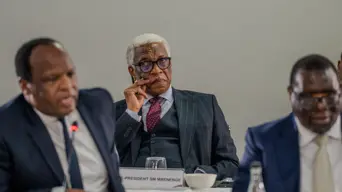Mbenenge tribunal: Mengo’s WhatsApp messages again become subject of scrutiny
This includes a series of texts sent by Mbenenge on 23 June 2021, which were later deleted.

Eastern Cape Judge President Selby Mbenenge (centre) listens to testimony during the Judicial Conduct Tribunal's inquiry into sexual harassment allegations against him in Sandton, Johannesburg on 1 July 2025. Picture: Sphamandla Dlamini/EWN
JOHANNESBURG - The WhatsApp messages sent by High Court secretary Andiswa Mengo have again become the subject of scrutiny before the Judicial Conduct Tribunal investigating allegations of sexual harassment against Eastern Cape Judge President Selby Mbenenge.
This includes a series of texts sent by Mbenenge on 23 June 2021, which were later deleted.
ALSO READ:
- Mbenenge's legal team accuses gender expert of omitting texts sent by Mengo
- Mbenenge's legal team says Mengo did not fear authority as suggested by witness
Mengo responded by saying that the top judge was disturbing her and that she was getting heated.
The junior staffer also said Mbenenge should keep on drooling, that she likes it so that when he arrives, he would be interested.
Legal counsel for the Judge President, Advocate Muzi Sikhakhane, argued that the messages sent by Mengo are not consistent with the description painted by expert witness Lisa Vetten.
Sikhakhane submitted that Mengo was not timid and passive as suggested by the gender expert in her testimony.
“It’s fine. I’m going to put this bluntly, let me put this, she is telling him, ‘I want you to desire so that when we have sex, you have energy and desire.’ This child says so. I’m saying she’s not ambiguous, and she’s asking for that, I want you to have energy when you come to me.”
Tribunal chairperson, retired Judge President Bernard Ngoepe, also took issue with the submission that the interactions between the complainant and the top judge were laced with ambiguity.
Ngoepe asked, “Ms Vetten, is there any ambiguity in this statement?”
“No, there is no ambiguity. When you look at the context of times where she is saying, ‘no, no, no’ and then she gives a response like that - that’s when the ambiguity comes in,” replied Vetten.
Ngoepe asked, “But why do you bring the other things when we look at this specific statement, which stands on its own? Does it not say what it says?”
“It does say what it says,” Vetten replied.